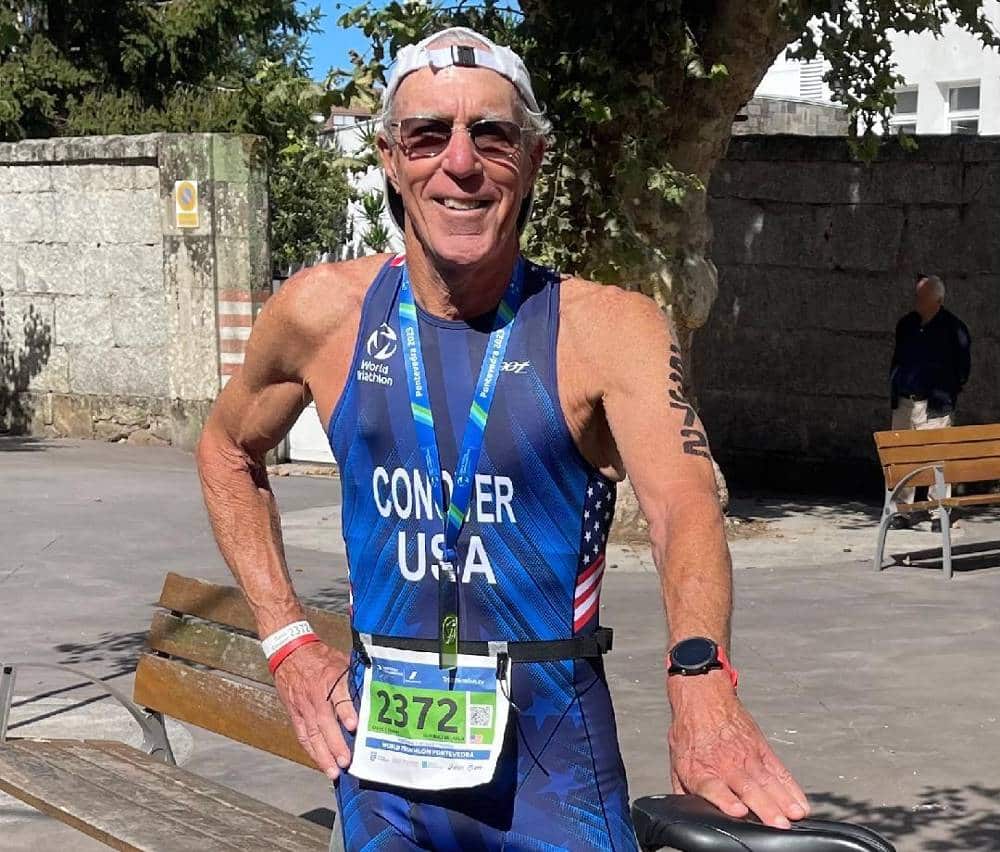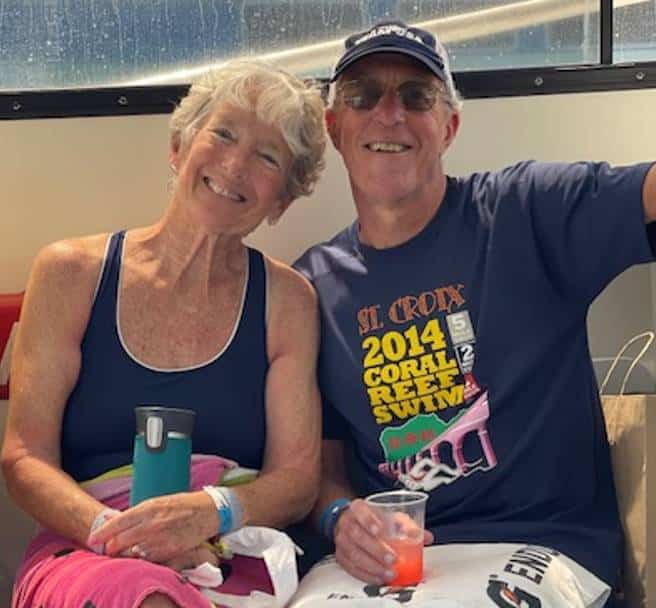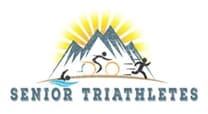I Found ‘Athlete’ In The Words ‘Heart Health’ – David Conover’s Story

Editor’s Note: You may think that any issue with a person’s heart health will end their hopes for triathlon, especially for older athletes. David Conover’s story proves otherwise.
I have been blessed to be able to compete in triathlon for over 30 years. More important, for almost 20 of those years I have been able to train and compete in spite of some medical challenges. Much of the credit goes to my cardio, pulmonary, and hematology focused doctors, my triathlon coach, and my family, including Louise, my wife of almost 50 years.
That said, I also had to ‘read my dashboard’, that is, keep track of relevant health and performance data. When a yellow light appeared, I had to seek help and follow their excellent guidance. A coach, medical professionals, and the athlete and their family comprise a formidable and necessary trio to support successful training and competing. They comprise the ‘tri’. The ‘athlete’, which can be created with the words ‘heart health’, fills it out.
Active Early Years
After swimming in college in the late 60s, I continued into my 20s with masters swimming and some recreational biking. These gave way to work and family responsibilities while I was in my 30’s. I had little extra time.
Around 1990, a son’s little league coach mentioned triathlon. Even though I did not run, I was interested in the sport. So, at 40, I decided to learn to run, do a triathlon, get fit, and lose some weight.
After doing one race I was hooked. I self-trained with advice from relevant print media, signed up for local races and, over time, made great friends in the tri community. Each year, I learned some new racing techniques, updated some of my equipment, and improved a little.
Heart Health Issues Appeared While Competing In Triathlon
A little more than 20 years ago, some medical issues arose. These challenged my triathlon journey and a number of other things. Through these, I have learned to listen to my body, record and assess relevant health data, eat right, and plan and execute under the guidance of medical professionals and a triathlon coach.
Thirty minutes after completing the 2005 Timberman half iron distance in New Hampshire, in which I had really pushed the run during the last mile, I experienced some sweats, thirst, nausea, and very minor pain at my sternum. I went to the medical tent. Even though I had OK vitals, I opted to go to the ER, where I was tested over six hours. The doctor found me to be OK and released me.
I felt fine but the sternum symptom re-occurred over the next few days when I got my heart rate up a little.
Home in Virginia, I consulted a cardiologist. After looking at data from a number of past EKGs and a ‘fresh’ one, he informed me that I had had a mild heart attack. The sprint at the end of the triathlon dislodged some plaque. A clot formed in one artery adjacent to the plaque ‘rupture’. The clot restricted blood flow to part of the heart muscle.
I was sent to the hospital and underwent a cardiac cauterization. One stent was placed in the artery. While recuperating at home, I experienced a pulmonary embolism caused by an allergic reaction to one of the blood thinning drugs given during the stent placement.
Learning To Adapt
After recovering from the stent placement and the embolism, I went to cardiac rehab. Through rehab, I got the confidence needed to return to exercise, and raced again eight months later.
My takeaway from that first medical challenge was to listen to your body and learn what is and is not normal for you, including values for pace, pedal power, swolf, and the data athletes now collect via heart rate monitors. Also, establish relationships with medical professionals you respect and trust. And, don’t be afraid to ‘get back on the horse’.
My next medical hurdle occurred in 2009 and 2010. This consisted of a deep vein thrombosis (DVT) that lead to another pulmonary embolism. During this period, I was also treated for prostate cancer (seed implants) and a case of shingles.
With the help of my growing medical team, I was able to successfully meet these medical challenges and continue to train and compete. From these experiences, I added resources to my medical team to include hematology, pulmonary and urology. I gathered more medical information about these conditions, their treatment, and their impact on performance data related to my training and racing.
I essentially followed the same game plan, but it was now more complicated. Being on a blood thinner meant having to train and race more carefully. I didn’t want to get kicked in the swim, crash on the bike, or trip and fall on the run.

Adding A Triathlon Coach
Fast forward to 2019. For almost 10 years, I was able to successfully train and compete every year. This was thanks to the help of great medical professionals with whom I was actively engaged on a regular basis. Of course, I had to heed their guidance.
After qualifying for Team USA in Cleveland, I added another member to my team. I had been self-coaching since my first triathlon. In late 2019, my training was enhanced with the help of a triathlon coach.
For the next three years, I continued to have checkups with my medical team. With the help of my coach, I was able to improve both my times and my health metrics. My heart rate decreased while resting and while training and competing compared to my pre-2019 seasons. In short, I became more efficient, which had a positive impact on my times as well the level of effort I had to put out while training or racing.
All was good, except COVID came along and in late 2022, after some running speed work, I had another health scare.
Afib Enters The Picture
On September 23, 2022, I was awoken from a deep sleep by what turned out to be atrial fibrillation (Afib). Over the years I had had some missed heart beats. My cardiologist felt the missed beats were not an issue since I would return to normal (sinus) rhythm with a deep cough.
A trip to the ER confirmed Afib. I visited my cardiologist right after leaving the ER and left his office feeling much better. The Afib had stopped but I had atrial flutter so he ordered a 24/7 cardio monitor, stress test, and cardiac echo test.
A week later I was back to normal and even did a 5K on October 1st. After a review of my test results in early October, I was considered healthy and the Afib event history. Then I came down with COVID and within 12 hours of an antibody infusion the Afib came back. This time, the Afib would not go away.
While the COVID went away, the Afib did not and I went to the ER again. This was followed by appointments with my cardiologist and a new medical professional.
Afib and Athletic Performance
Aside from not feeling ‘right’, my training was significantly impacted. However, I could still stay active in spite of Afib. I could still swim and bike at a much slower rate. It was a blessing this was in my off season. What had been a nice 10-minute pace for an easy long run at an aerobic heart rate became a 13-minute pace at or above maximum heart rate. I was now out of breath and having to walk in less than 10 minutes.
With the help of my cardiologist, I added an electrophysiologist to my medical team. I was not aware of the term ‘electrophysiology’. Neither did I know there were electrophysiologists, doctors who were expert in the heart’s electrical circuitry and impulses.
An Effective Treatment for Triathlon-Ready Heart Health
I did considerable reading about the heart and electrical impulses, an interesting addition to my understanding of its mechanical pumping operation. After this, I consulted with my new doctor and decided to undergo an atrial ablation. I had the procedure on February 1, 2023 at the INOVA Heart and Vascular Institute in Fairfax, Virginia.
You can think of your heart’s normal sinus rhythm like skipping one stone over a smooth pond once every second and watching the waves on the pond. Then imagine many others showing up at the pond to randomly skip stones and upset the waves you were making. During the procedure, those throwing the extra stones are identified and blocked. You are left alone throwing one stone per second.
From an exercise point of view, or any effort that increases your heart rate, having Afib felt like I was carrying ‘extra baggage’ in my swim jammers, on my bike, and on the soles of my shoes. Being back in sinus rhythm, I was cleared to go home. After a two-week period to heal the incisions associated with the ablation procedure, I started exercise again. The exercise was light at first, then ramped up over time.
Back In The Saddle
During this period, my medical team and coach were invaluable. Two months after the procedure I completed a sprint triathlon. During the remainder of 2023, I continued to train and compete successfully with no issues related to my heart.
I continued to see my doctors. With their and my coach’s help, and my family’s invaluable support, I was able to compete at the World Championship in Spain in September 2023.
Heart Health and Triathlon
As 2024 gets underway, I continue to train using the weekly schedule provided by my coach, visit with and follow the guidance of my medical team, and gather and evaluate medical and workout data.
Everyone is different and has different likes and dislikes and capabilities and talents. That said, no matter your age or abilities, a healthy diet, exercise and a good night’s sleep are all important factors in establishing the basis for good outcomes.
Read as much as you can about health and medically-related topics. My experience also underscores the importance of listening to your body. It has also taught me the value of taking relevant data such as pulse rate and blood pressure. Rounding this out with data on run and swim pace and bike power output and you have a basis for making informed decisions. Those data are the way your body speaks to you as well as medical professionals and coaches.
Regardless of your abilities or athletic interests, consider setting some measurable athletic goals no matter what you choose to do to stay active. Work with a coach or health club staff, establish a relationship with medical professionals, gather and assess relevant information and most importantly be willing to adjust your expectations, training, and race schedule as warranted.
Better than feeling good, you ideally can successfully meet the challenges that come with age and be one of a few lining up for a race in a 70’s or even 80’s age group.
Dave Conover’s Story on NBC Washington
Related Senior Triathletes post: Can I Do Triathlon With Afib?
Leave Your Questions and Comments Below
Comments: Please note that I review all comments before they are posted. You will be notified by email when your comment is approved. Even if you do not submit a comment, you may subscribe to be notified when a comment is published.

Tenacity coupled with good judgment wins the race, You have both. Kudos to you!
Congrats for all of this. Amazing story.